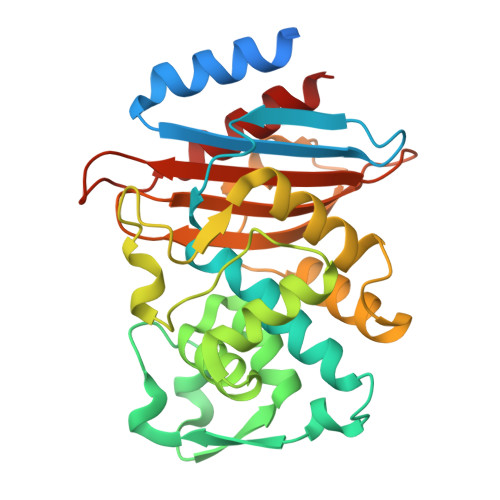Probing the modulation of enzyme kinetics by multi-temperature, time-resolved serial crystallography.
Schulz, E.C., Prester, A., von Stetten, D., Gore, G., Hatton, C.E., Bartels, K., Leimkohl, J.P., Schikora, H., Ginn, H.M., Tellkamp, F., Mehrabi, P.(2025) Nat Commun 16: 6553-6553
- PubMed: 40670369
- DOI: https://doi.org/10.1038/s41467-025-61631-2
- Primary Citation of Related Structures:
9G5S, 9G5W, 9G5X, 9G61, 9G6L, 9G6M, 9G6N, 9G6O, 9G6P, 9G7V, 9G7W, 9G7X, 9G7Y, 9G7Z, 9G80, 9G81, 9G82, 9I7L - PubMed Abstract:
The vast majority of protein structures are determined at cryogenic temperatures, which are far from physiological conditions. Nevertheless, it is well established that temperature is an essential thermodynamic parameter for understanding the conformational dynamics and functionality of proteins in their native environments. Time-resolved crystallography is a technique that aims to elucidate protein function by examining structural alterations during processes such as ligand binding, catalysis, or allostery. However, this approach is typically conducted under ambient conditions, which may obscure crucial conformational states, that are only visible at physiological temperatures. In this study, we directly address the interplay between protein structure and activity via a method that enables multi-temperature, time-resolved serial crystallography experiments in a temperature window from below 10 °C to above 70 °C. Via this 5D-SSX, time-resolved experiments can now be carried out at physiological temperatures and with long time delays, providing insights into protein function and enzyme catalysis. Our findings demonstrate the temperature-dependent modulation of turnover kinetics for the mesophilic β-lactamase CTX-M-14 and the thermophilic enzyme xylose isomerase, within the full protein structure.
- University Medical Center Hamburg-Eppendorf (UKE), Hamburg, Germany. ec.schulz@uke.de.
Organizational Affiliation:



















